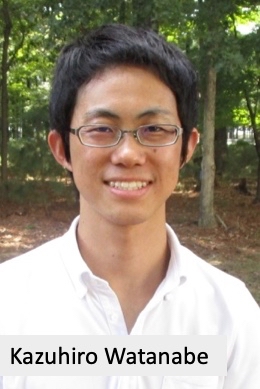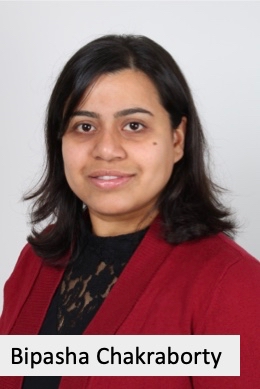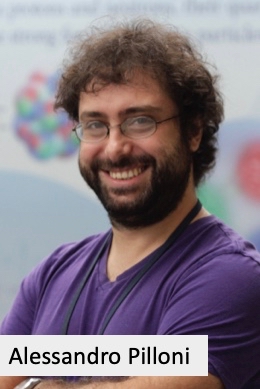Alessandro Pilloni, Bipasha Chakraborty and Kazuhiro Watanabe are participating in the 2018 Promising Young Scientist program.
Three early-career nuclear physicists are learning how to speak about their research and prepare for the competitive job market through JSA-sponsored program.
For newly minted Ph.D. physicists, entering the job market after spending nearly a decade in college can be a daunting task. The Promising Young Scientist program at Jefferson Lab aims to help early-career nuclear physicists prepare for putting their best foot forward.
According to Rakitha Beminiwattha, assistant professor of physics at Louisiana Tech University and the program’s principal investigator, the program helps early-career nuclear physicists prepare for the job search in academia.
“Our goal is help early career nuclear physicists gain valuable academic job interview experience,” Beminiwattha said.
The program is staffed by volunteers who provide program participants with feedback on application materials, interview opportunities, and personalized critiques for improving their colloquium presentation skills.
A main focus of the program is to help early-career nuclear physicists improve their presentation skills. The colloquium has become an integral part of the interview process for many nuclear physics jobs. In this public talk, candidates must be able to speak about their research accurately and yet in simple terms, an often difficult task for candidates who have spent the better part of a decade gaining complex technical knowledge in a narrow field of study.
However, mastering the public talk not only helps prepare candidates for this important part of the job interview process, it also helps them to be better able to articulate their research to the general public, which is in line with the long term goal for the program of helping to re-invigorate the tradition of the general audience accessible colloquium by nuclear physicists.
“The program has two primary goals: to support junior nuclear physicists in preparing for a highly competitive academic job market and to promote the effective dissemination of exciting new developments in nuclear physics,” said Beminiwattha.
Since 2010, the program has benefitted more than two dozen early-career nuclear physicists, with more than 70 percent of past participants having secured permanent employment in tenure-track academic positions.
Beminiwattha participated in the program in 2015. He credits the program with helping him in the interview process that led to his current position at Louisiana Tech University.
“This program helped me to gain confidence in giving a colloquium and gave me an opportunity to practice job interview skills,” he said.
In 2018, three young researchers were chosen to participate out of seven applicants. Each participant has also already been invited to give a public colloquium:
● Alessandro Pilloni (Jefferson Lab postdoctoral scientist) has been invited to the University of Manitoba.
● Bipasha Chakraborty (Jefferson Lab postdoctoral scientist) has been invited to Virginia Union University.
● Kazuhiro Watanabe (Jefferson Lab postdoctoral scientist) has been invited to Christopher Newport University.
The program is supported by the Jefferson Science Associates Initiatives Fund program. JSA manages and operates Jefferson Lab for the U.S. Department of Energy, and the Initiatives Fund supports programs, initiatives, and activities that further the scientific outreach, and promote the science, education and technology missions of Jefferson Lab and benefit the lab’s user community.
Contact: Kandice Carter, Jefferson Lab Communications Office, 757-269-7263, kcarter@jlab.org




